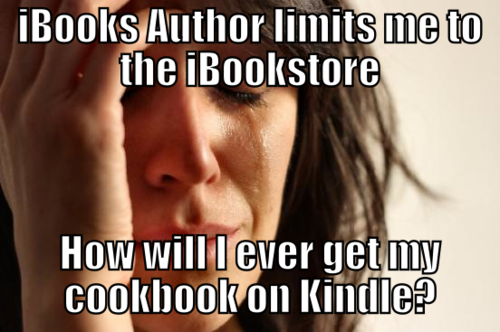iBooks Author EUA: Much Ado about Nothing.

After Apple introduced their revolutionary game changing iBooks Author program the other day, the blogosphere went into a collective gran-mal seizure about how restrictive the licensing agreement was. Fun to watch. Of course, the same over reaction happened when iTunes came out ten years ago. Wailing and gnashing of teeth. The world is not fair! Wah wah wah. Jealousy is such an ugly thing, especially from those folks that think everyhting should be given to them for free for some reason. (Maybe they need to read “A Nation of Moochers: America’s Addiction to Getting Something for Nothing.”)
Here are some of the over-reactions:
Ed Bot:Apple’s mind-bogglingly greedy and evil license agreement
iBooks Author software license agreement locks authors into Apple
iBooks Author software license agreement locks authors into Apple
Does Apple Own You? The LA Times ponders
The upshot, for those of you too lazy to click on the links, is this:
If you create a book using iBooks Author and you plan to sell it, you have to sell it through Apple. (You can’t for instance, also sell it on Kindle, or Nook, or in the Android market.)
It only works on iBooks 2 for iPad.
You CAN give it away for free to whomever you want to.
You can export it as a PDF file and give it away.
But you have to use Apple if you want to sell it.
Some of the complaints were also that there that Apple made the software only for Mac. This pissed off the PC crowd, who, for a good 30 years, crowed loud and hard about “PC Only” software being a reason to get a Windows machine over a Macintosh. (“It’s not available on a Mac? Too bad. Get a PC.”) How does it feel to be on the other side of the fence Windows fanboyz? Of course, the Linux crowd immediately got busy trying to copy it so they can claim theres is a better version because you can change the look and feel. Yawn.
So the big complaints are not that the program is a game changer. It is. No doubt about it. There is nothing like it anywhere. No free software, no PC software, no LInux software. The cries about it not being on a PC are simply the jealous rants of folks that got left off and foolishly have not purchased a Mac. (Sorry, I can’t help you with poor decision making there.)
The closest thing even near to it is the Adobe Publishing Suite, but that is $500 more than the free, drag-and-drop ease of use iBooks Author tool. There simply is nothing like it out there for the price point. Sorry. Apple just stuck their enormous corporate finger in the eye of the publishing world, Amazon, Barnes and Noble, Adobe, and Android in one fell swoop.
The main complaints are about the way you can share. Here is the typical argument:
Apple is putting restrictions on the way the creators of content can distribute the content. The flawed analogy heard in several places, is that this is akin to Microsoft putting restrictions on how you can distribute something that is written in MS Word.
If I want to sell something, then dammit I should be allowed to sell it anywhere, anytime to whomever or whenever I want.
Fair enough, sort of. But I think that many of the people complaining are making the comparison of a word processor output, which this is not. This is essentially a program, just like an app for iOS or Android is a program. So lets look at something very similar, if this is indeed a program, which it is. (See Al Gore’s Our Choice app) If you can concede that the OUTPUT of the program is another program, not simply a book in the tradition sense of “book,” then there are plenty of similar licensing agreements in place that no one is complaining about:
If I create an Android program, I am “stuck” in the Android marketplace, unless I give it away for free. I have to sell my program to the people that use ANDROID devices. I can’t all of a sudden sell my content to the iTunes Store. It won’t work. I can’t sell it on the Sony Marketplace, or in the XBOX Live arena.
If I want to sell to different markets, have to recreate the program for each market I intent to sell it to.
If I want to sell to the iOS crowd, I have to write it using the SDK for iOS.
If I want to write for Mac, I have to use C+ or Cocoa or whatever the hell Mac programmers program in.
Same for Windows. Same for Linux.
But no one seems to be seeing it that way. All they are doing is freaking out because it is not “more free.”
If I make a program, I have to write it and then rewrite it for the market I am targeting. It is not a write-once-work-everywhere world. It isn’t. If you think it is, then you are stupid. Sorry, I had to say that.
But there seems to also be pushback to the haters of the EUA for iBooks Author as cooler heads begin to prevail:
Mike Elgin at Cult of Mac states it rather clearly and bluntly:
Is it too obvious to point out that Apple’s terms are optional? Nobody is forced to accept them. Is Microsoft greedy and evil for charging $120 for Microsoft Office? If I don’t like the price, I don’t have to use it. Apple’s iBooks Author is just an offer. Take it or leave it. Nobody is being coerced. On the contrary, Apple’s terms aggressively champion the cause of free books. There are several powerful incentives for authors to give books away free. Who wrote this policy, Richard Stallman? Apple’s authoring tool is free, and if you don’t charge for the book, you can distribute it anyway you like. Wow!
David Smith wrote: “The real story here today shouldn’t be that Apple has ‘audaciously’ claimed ownership of the books make with iBooks Author but that they have created an avenue for non-commercial distribution that would exclude them entirely. That is actually unprecedented.”
Daring Fireball glommed onto Smith with this observation:
“it’s about not wanting iBooks Author to serve as an authoring tool for competing bookstores like Amazon’s or Google’s. The output of iBooks Author is, as far as I can tell, HTML5 — pretty much ePub 3 with whatever nonstandard liberties Apple saw fit to take in order to achieve the results they wanted. It’s not a standard format in the sense of following a spec from a standards body like the W3C, but it’s just HTML5 rendered by WebKit — not a binary blob tied to iOS or Cocoa. It may not be easy, but I don’t think it would be that much work for anyone else with an ePub reader that’s based on WebKit to add support for these iBooks textbooks. Apple is saying, “F— that, unless you’re giving it away for free.”
Do as you wish, but remember, there are other e-pub creators out there. Use them if you don’t like Apple’s EUA. No one is holding a gun to your head. Buy Adobe’s solution. Use FOSS software. Write it in Pages and convert to e-pub format. Use Word and, well, save as RTF.
As for me, I am going to see what the program can do, and start making some awesome material. The program has inspired me. It has inspired a lot of people to start writing and exploring. And that my friends, is priceless.

Get over yourself and start writing.